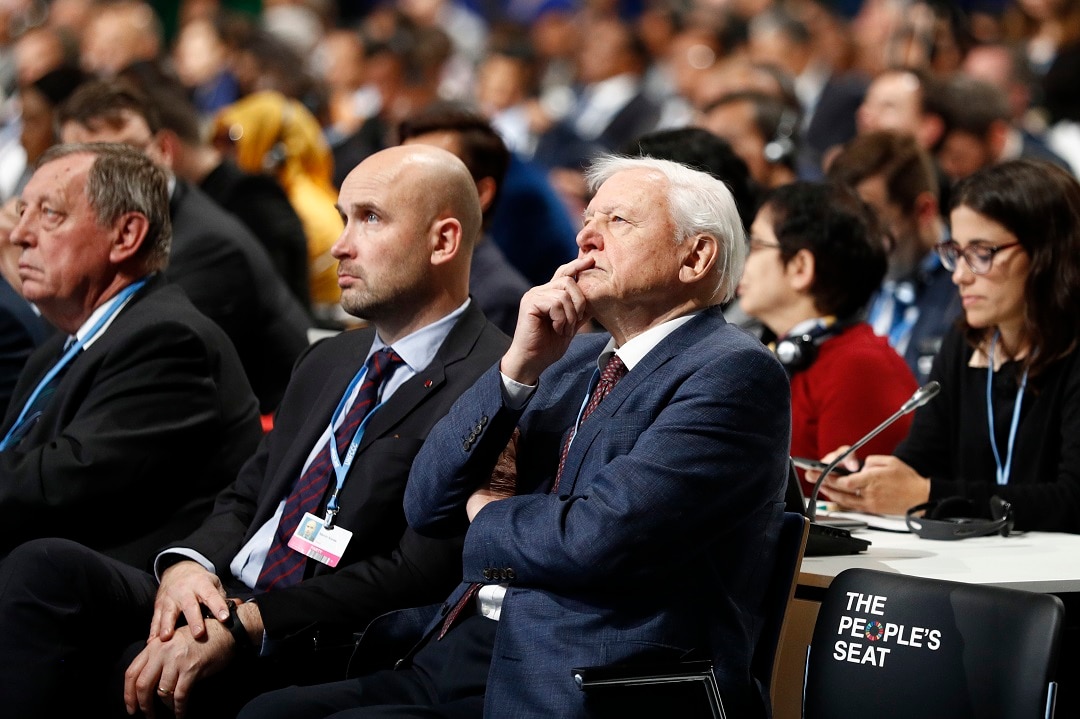British broadcaster and environmentalist David Attenborough has urged world leaders to agree on ways to limit global warming and tackle "our greatest threat in thousands of years".
At a United Nations climate summit in Poland, Mr Attenborough told delegates of almost 200 nations that the fate of the world rests in their hands.
"Leaders of the world, you must lead," said the celebrated naturalist who was given a "People's seat" at the two-week conference in the coal city of Katowice.
"The continuation of our civilisations and the natural world upon which we depend, is in your hands," he said. "Climate change is running faster than we are and we must catch up sooner rather than later before it is too late."
Known for countless nature films, Attenborough has gained prominence recently with his Blue Planet II series, which highlighted the devastating effect of pollution on the oceans.
Attenborough told the delegates: "Right now, we are facing a man-made disaster of global scale. Our greatest threat in thousands of years. Climate Change." The Katowice talks are billed as the most important UN conference since Paris, coming ahead of an end-of-year deadline to agree to a "rule book" on enforcing action.
The Katowice talks are billed as the most important UN conference since Paris, coming ahead of an end-of-year deadline to agree to a "rule book" on enforcing action.

David Attenborough listens to a speech during the COP24 United Nations Climate Change Conference in Poland. Source: Getty Images
The world is currently on course to overshoot, by far, the limits for global warming agreed in the landmark 2015 Paris accord on climate change, which were intended to prevent more extreme weather, rising sea levels and the loss of plant and animal species.
Yet political and UN leaders have been struggling to inject urgency into two weeks of haggling on how to move-on from fossil fuels to give practical effect to the Paris accord.
Representatives of some of the most powerful countries and biggest polluters were conspicuous by their absence, and the United States is quitting the UN climate process.
To maximise the chances of success in Poland, technical talks began on Sunday - a day early- with delegates debating how to meet the Paris target of limiting global warming to between 1.5 and 2.0 degrees Celsius (2.7 and 3.6 Fahrenheit).
Michal Kurtyka, Poland's deputy environment minister and president of the talks, said that without success in Katowice, Paris would not be a success, as it had only decided what was needed, not how it could be done. Moreover, the wider political environment had changed.
"The wave of optimism and global co-operation that carried us to and through Paris has now crested, broken and is now tumbling," he told delegates.
He nevertheless took heart from a G20 statement at the weekend when the leading industrialised nations - except the United States - reaffirmed their commitment to implementing the Paris deal.
A series of reports in the run-up to the Katowice conference have made clear the widening gap between high-level rhetoric and actual work to cut emissions, which have continued to rise.
"It is hard to overstate the urgency of our situation," UN Secretary General Antonio Guterres said. "Climate change is running faster than we are and we must catch up sooner rather than later before it is too late."
Yet, expectations for Katowice are low.
The host nation Poland is committed to coal, the most polluting of fossil fuels and is calling for a "just transition" to provide help for communities dependent on fossil fuels.
Riots in Paris at the weekend, partly in protest at fuel taxes, also illustrate the conundrum: how do politicians introduce long-term environmental policies without inflicting costs on voters that may damage their chances of re-election?
To contain warming at 1.5 degrees Celsius, man-made global net carbon dioxide (CO2) emissions will need to fall by about 45 per cent by 2030 from 2010 levels and reach "net zero" by mid-century, according to the UN Intergovernmental Panel on Climate Change (IPCC).
Delegates at the talks said sticking points were likely to include finance and the level of scrutiny associated with monitoring individual nations' emissions.
The UN has a goal of raising US$100 billion ($135 billion) every year from 2020 for climate action. To inject momentum, the World Bank Group said it would provide a further US$200 billion over five years from the start of the next decade.
Reuters


